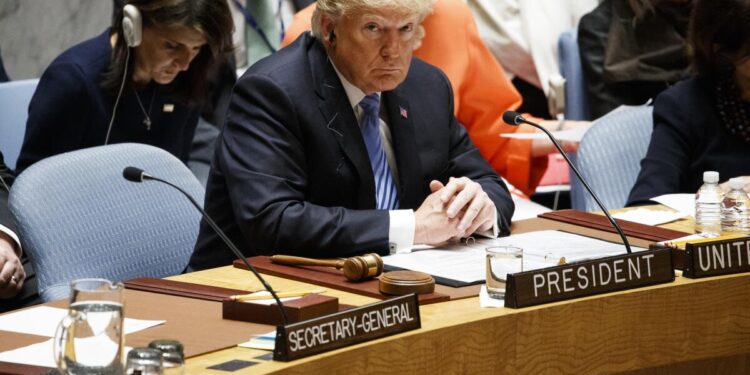Donald Trump’s first term as President of the United States certainly didn’t win any awards for promoting responsible global governance. His decisions to pull the U.S. out of key multilateral agreements like the Iran nuclear deal and the Paris climate accords highlighted his unconventional approach to international cooperation. Unlike the Biden administration, Trump seemed uninterested in the so-called “rules-based international order.” But there’s a potential silver lining here.
Globally, the U.S. claim to uphold stability through a “rules-based” order doesn’t always generate the positive reactions one might expect. Instead of presenting an inspiring vision, it often highlights perceived American hypocrisy. Trump could benefit from dropping this term altogether.
The D.C. foreign policy circle, often referred to as the “blob,” embraced the idea of a rules-based order in recent years. It was a beacon for both liberals and neoconservatives who felt blindsided and sidelined by Trump’s rise. Under the Biden administration, this notion became a cornerstone of foreign policy, rallying allies to counter China and Russia, nations accused by Washington of challenging the status quo. However, the pitfalls of this concept have been exposed, especially when considering U.S. actions such as arming Israel despite its repeated breaches of international law.
More critically, the “rules-based” idea conceals some revisionist goals of its own. The aim of maintaining American dominance in the international arena has inhibited the establishment of a practical global legal framework, risking the emergence of competing systems instead of a unified, cooperative structure.
China has criticized the rhetoric of a rules-based order, viewing it as a guise for one-nation dominance. However, its response has been to work within the current system while seeking reforms to suit its interests. If Biden’s vision had crystallized into a cohesive bloc, China might have joined forces with Russia and countries from the Global South to create a rival structure with its own rules.
Even though the Global South has its differences with Russia and China, many of these nations unite in opposing the rules-based approach, which they see as a strategy to maintain American hegemony at the expense of emerging powers like Brazil and India. French President Emmanuel Macron echoed this sentiment at the 2023 Munich Security Conference, noting how much trust has been lost with the Global South.
A world where states no longer argue over interpretations of a singular legal system but propose competing rule sets is a daunting prospect. As America and its allies continue to fragment the global legal order under the guise of their rules, compliance wanes. An international order can’t be built by mandating rules for countries sidelined in their creation. Unsurprisingly, many international law experts now view the rules-based concept as a rival to, not an ally of, international law.
A fractured world lacking a robust framework for collaboration and conflict resolution brings the risk of heightened conflict and competition among great powers. It would struggle to manage military conflicts, prevent nuclear proliferation, or tackle shared challenges like climate change. Given the ongoing great-power competition, the pressing question is whether this rivalry will unfold under some shared framework or descend into a free-for-all.
This sets the stage for crucial decisions by Trump. He seems open to a multipolar world, but his engagement with rules and laws remains uncertain. However, if he’s truly committed to reducing America’s global military engagement and stepping back from the unpopular role of world police, promoting a multilateral system would align with U.S. interests—and his own.
Trump, ever the opportunist, often focuses on his benefits. His foreign policy during his first term leaned heavily on transactionalism, allowing him to sidestep Washington’s typical moral posturing in favor of tangible U.S. gains, as seen in the Afghan withdrawal negotiations with the Taliban. This self-interested stance could help him dismantle Washington’s narrative of a coalition-driven international order.
To achieve Trump’s foreign policy ambitions—like outpacing China economically and fostering peace in Ukraine—a well-functioning global order is essential. These ambitions can’t be realized without a reliable, predictable security landscape that prevents disputes from escalating into wars.
Certain existing norms, laws, and institutions do encourage positive outcomes and should be preserved, such as the United Nations Charter that restricts force and the UN itself. Resolving ongoing conflicts in Ukraine and Gaza will hinge on skillful diplomacy. But first and foremost, negotiations must occur under the shared belief in fair, common standards.
Unfortunately, the rules-based international order has failed to deliver on that promise. In the coming years, the United States must strive to improve.
Samuel Moyn is a law and history professor at Yale. Trita Parsi leads the Better Order Project at the Quincy Institute, collaborating with 130 scholars and officials from 40 countries to propose multilateral system reforms.
















